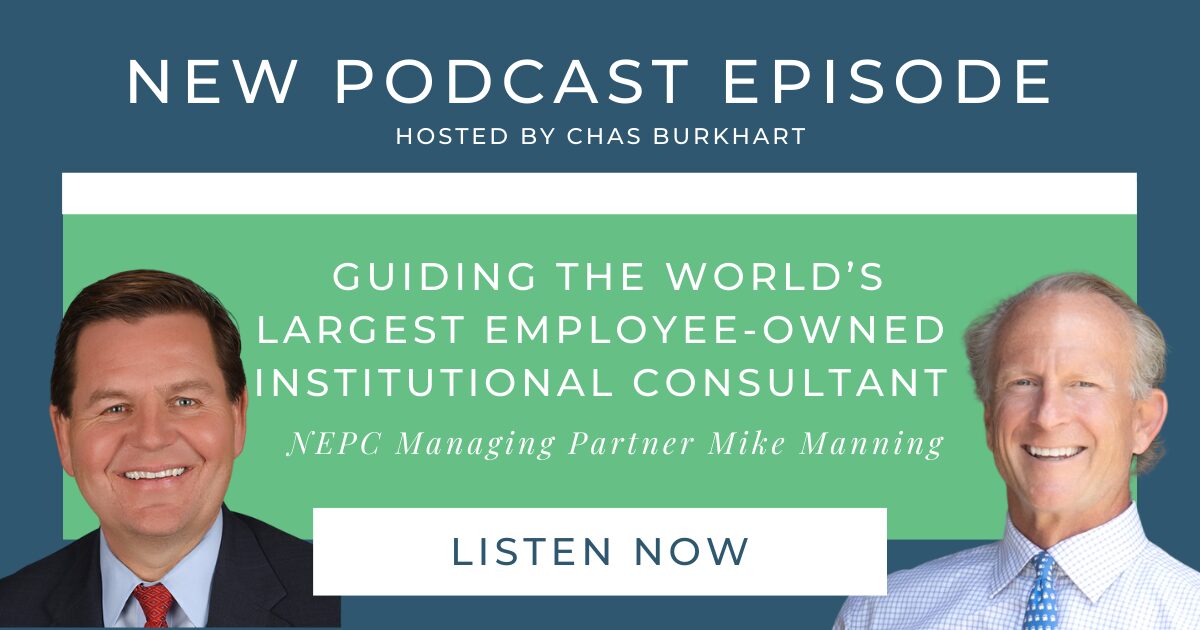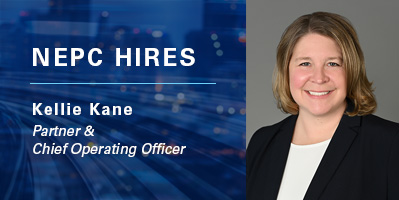Barron's PENTA: How to Invest as the Fed Starts to Ease up on the Accelerator
NEPC’s Karen Harding was quoted in a recent Barron’s PENTA article which was an in-depth guide for how ultra-high net worth individuals should be thinking about allocations and working with their advisors to navigate this economic environment. View the article on the PENTA site here.
Investors have spent the past 18 months watching as the U.S. central bank hiked interest rates from a pandemic low of between 0.25% and 0.50%, all the way up to 5.5%.
Now, with just one Federal Reserve policy meeting left in the year, the best strategy might be a proactive one: trying to get ahead of what the central bank does in 2024, according to Karen Harding, team leader for the private wealth practice group at Boston-based NEPC.
“What’s important for investors to keep in mind is that we’re probably at the peak of the tightening cycle,” Harding says.
. . .
The past two years have been a bloodbath for bonds, as markets reacted to higher rates, and to policymakers’ insistence that rates may remain higher for longer than many investors expect. “When you’re in a rate-cutting cycle, bond prices go up,” Harding says. “So, just as bond investors have seen losses in their portfolios, they will get gains now.”
. . .
Financial advisors to wealthy clients should have, or be able to tap, expertise on the kind of credit research needed to pick individual bonds for a portfolio or a ladder, Harding says. “It really does benefit most investors to have a professional invest for them.” Those who don’t have quite as much to invest still might be able to get similar exposure from an exchange-traded fund or mutual fund.
Still, there’s good reason for investors, especially squeamish ones, to simply sit on the sidelines for a bit. “You can get more on a cash yield [basis] than you can holding a fixed income instrument because the yield curve is still inverted,” Harding says. That is, shorter-term rates are higher than longer ones. That’s traditionally been a sign that investors are expecting an economic downturn relatively soon.
U.S. News & World Report: How Financial Advisors Work With Billionaires
NEPC’s Karen Harding was quoted in a recent U.S. News & World Report article to provide insight into how advisors work with ultra-high-net-worth clients to preserve generational wealth. View the article on U.S. News’ site here.
Managing a billionaire’s finances may entail intricate financial instruments, such as trusts, foundations, and investments in various industries and asset classes. In addition, tax optimization and estate planning become paramount to preserving wealth across generations.
While allocating into a balanced portfolio of cost-effective exchange-traded funds is frequently a winning strategy for mass affluent clients, that’s usually not enough for a billionaire’s assets.
. . .
“A trusted advisor will work alongside clients to help create and execute a customized portfolio based on their client’s needs and objectives,” says Karen Harding, a partner in the private wealth practice at Boston-based NEPC.
The factors a billionaire’s advisor considers include goals and objectives, risk tolerance, tax status, cash flow needs and entity structure in order to build an appropriate portfolio, Harding says. Here are some of the criteria billionaires use when selecting financial advisors to handle their wealth:
. . .
“With over three decades of experience working with ultra-high-net-worth clients, we often see a focus on maintaining multi-generational wealth,” Harding says.
“One consideration to keep in mind is that clients often still own the operating business which created their family’s wealth,” Harding adds. “If this is the case, the investment portfolio needs to take the operating business into consideration when decisions are being made for the investment portfolio.”
. . .
Harding says billionaires seek advisors with whom they have a strong alignment and no conflicts of interest.
“They tend to work with advisors who have the deep resources required to successfully execute their desired plan, who have the technical skills required to create and implement a sophisticated portfolio,” she says.
Click here to continue reading the full U.S. News & World Report article.
U.S. News & World Report: How to Find a High-Net-Worth Financial Advisor
NEPC’s Karen Harding was quoted in a recent U.S. News & World Report article to provide insight into factors high-net-worth investors should consider when seeking services beyond asset management. View the article on U.S. News’ site here.
When it comes to selecting a financial advisor, wealthier investors often need a different level of service, when compared to what’s called the “mass affluent.”
An investor with assets between $100,000 and $1 million is generally considered mass affluent, but the definition of high net worth varies. Some advisors consider a high-net-worth client to have over $1 million in assets; others use a $10 million threshold.
Choosing a financial advisor can be challenging for high-net-worth investors for a few reasons. Because they have more complex financial needs, high-net-worth clients need an advisor, or team of advisors, with specialized skills. Keep the following tips in mind as you select the best advisor for your needs:
. . .
Karen Harding, a partner in the private wealth practice group at NEPC in Boston, MA, says services high-net-worth clients should consider, in addition to asset management, include financial and estate planning, tax strategy, financial reporting, philanthropic advisory services, property management, household management, aviation management, and financial education and assistance for family members.
“While most firms do not offer all of these services, they are able to outsource to other firms to ensure that the client has their needs met,” she says.
. . .
Harding adds that high-net-worth clients should consider whether or not an advisory firm has adequate resources and a team of professionals with the technical skills and qualifications required to do the job well.
“Make sure that an advisor has plenty of experience working with clients in similar situations and is trustworthy and personable,” she says. “Do not underestimate the importance of a good working relationship.”
Click here to continue reading the full U.S. News & World Report article.
Pensions & Investments: Market Shocks Prompt Allocation Overhauls
NEPC’s Aaron Chastain was quoted in a recent Pensions & Investments article to weigh in on how corporate pension plan portfolios in the U.K. & U.S. have been distorted by upheaval. View the article on Pensions & Investments’ site here.
Corporate pension fund portfolios in the U.K. and U.S. that have been distorted by recent market events are set for an asset allocation overhaul. A combination of rising interest rates leading to falling liabilities, plus increased needs for liquidity in portfolios means asset allocations are, in some cases, no longer serving their intended purpose on either side of the pond. Sources said pension fund sponsors now have an opportunity to further derisk portfolios, with a view to completing a risk transfer or achieving self-sufficiency.
. . .
There are also conversations among U.S. plans on what constitutes an appropriate interest rate hedge, since it “now takes less dollars to achieve the same interest rate hedge,” said Aaron Chastain, Atlanta-based senior consultant at NEPC LLC.
. . .
NEPC’s Mr. Chastain is also seeing some clients reducing commitment sizes but not stopping investments altogether. They “definitely don’t want to eliminate those relationships (with fund managers) for a shorter-term market event in terms of an asset allocation perspective,” he said.
Click here to continue reading the full Pensions & Investments article.
Bloomberg: Stocks See Late-Day Rebound After Unnerving Twists: Markets Wrap
NEPC’s Phill Nelson was quoted in a recent Bloomberg article to discuss what to expect from the 9/21/22 Fed meeting’s announcement on interest rates. View the article on Bloomberg’s site here.
Stocks pushed higher in the final hour of New York trading, with a rally in megacaps like Apple Inc. and Tesla Inc. driving a rebound that followed the worst weekly rout for the market since mid-June.
Major equity benchmarks had a tough time finding direction Monday as traders geared for another super-sized US rate increase amid fears on whether the Federal Reserve could overtighten and raise the odds of a hard landing. Treasury 10-year yields hovered near 3.5% while the two-year rate, which is more sensitive to imminent policy moves, hit the highest since 2007.
. . .
“The question to focus on isn’t whether the Fed will hike rates by 75 basis points or 100 basis points,” said Phillip Nelson, head of asset allocation at NEPC. “What we’re looking for is how aggressive Powell will be in the next six to 12 months. The messaging we get in the next few weeks could be a bigger data point and a shock to investors.”
Pensions & Investments: ESG: Multi-Asset Investing
NEPC’s Dulari Pancholi was featured in a recent Pensions & Investments article to share top ESG themes as well as developments in data, benchmarks and regulation that are powering continued inflows into ESG investing across both public and private assets. View the article on Pensions & Investments’ site here.
Environmental, social and governance investing has evolved far beyond a process based on exclusion to one that is inclusive, activist and focused on alpha. Institutional investors are addressing the dual purpose — to effect change and generate alpha — via a range of sustainable investment approaches, typically impact funds, asset-specific ESG strategies or multi-asset portfolios.
Across all approaches, the state of investing based on ESG factors is robust. Global ESG assets under management were $35.3 trillion in 2020, up 15% from $30.6 trillion in 2018, according to the Global Sustainable Investment Alliance. ESG’s portion of total global AUM rose to 35.9% from 33.4% in the same period.
GSIA projects global ESG AUM will rise 16%, to $41 trillion, this year; and 22%, to $50 trillion, by 2025. The message is clear: ESG investing is here to stay, and its future is bright
. . .
While a multi-asset strategy can be one of several ways to implement an ESG investment approach, Dulari Pancholi, CFA, CAIA, principal and head of credit and multi-asset at NEPC, said that she sees multi-asset as the right approach for asset owners today.
“The way ESG investing has evolved almost requires you to take a multi-asset approach,” she said. “The investible universe has expanded so much beyond the listed stocks where ESG originated. Now there are asset classes like private debt and private markets, or debt more generally, [and they] are tougher to work with” in terms of the availability of ESG products and challenges in ESG data collection. “In the fixed-income space, for example, you now have green bonds, which are an evolution of green revolving-loan facilities. There are term loans that are tied to sustainability metrics and sustainability-linked bonds that are tied to the ESG performance of the portfolio or underlying company.
“So if you’re trying to build an ESG portfolio that can integrate some or all of the available asset classes, you need a toolbox that can hold a lot of different tools. That’s what multi-asset is all about,” Pancholi said.
Click here to continue reading the full Pensions & Investments article.
The Wall Street Journal: Almost Half of Stock Pickers Beat the Market in Early 2022 Selloff
NEPC’s Tim McCusker was quoted in a recent Wall Street Journal article to discuss how active managers have benefitted from monetary tightening in early 2022. View the article on The Wall Street Journal’s site here.
Nearly half of large-cap U.S. stock-picking funds beat the S&P 500 during the brutal selloff in the first half of the year, putting active managers on pace for their best year since 2009.
Bruised by sky-high inflation and rising interest rates, the S&P 500 fell 20% on a total return basis, which includes dividends as well as price changes, in the first six months of 2022. That was the index’s worst first half in data going back to 1988, according to Dow Jones Market Data.
. . .
“In the first half, active managers being compared against the market may have benefited from the environment of monetary tightening as the Federal Reserve began raising interest rates”, said Tim McCusker, chief investment officer at investment consulting firm NEPC.
“That’s a helpful thing for active managers,” he said. “Instead of money just flooding into equity markets and pushing all assets higher, you’re starting to see some differentiation.”
Click here to continue reading the full Wall Street Journal article.
Global Investment Leaders: Mike Manning on Guiding the World's Largest Employee-Owned Institutional Consultant
NEPC Managing Partner Mike Manning joined Rosemont CEO Chas Burkhart on the latest episode of the Global Investment Leaders podcast to share his perspective on the firm’s evolution since its founding in 1986, how NEPC is positioning for the future, and more.
Listen now:
NEPC Appoints Former Meketa Executive To COO Role
BOSTON–(BUSINESS WIRE)– NEPC, a leading research-driven investment consultant with $1.4 trillion in assets under advisement, today announced that Kellie Kane will join the firm as Partner and Chief Operating Officer (COO), effective May 2, 2022. Kane will be responsible for overseeing the execution and implementation of NEPC’s forward-looking operational strategy, including the firm’s performance reporting, technology, and discretionary operations teams. She will be an active member of the firm’s Executive Team, and will report directly to Managing Partner Mike Manning.
“I am happy to announce that Kellie Kane has joined our team as Partner and Chief Operating Officer,” said Manning. “Her skillset and industry experience make her uniquely suited to this role. I know she will play a large part in helping us achieve our strategic operational goals.”
Prior to joining NEPC, Kane spent 24 years at Meketa Investment Group where she most recently served as Partner and Chief Operating Officer. In this previous role, Kane oversaw a large staff across teams like IT, systems development, data, performance reporting, investment analytics, administrative, and transfer operations.
“Joining NEPC means I’m joining a firm with an incredible reputation, earned through its employee-led culture and client-focused philosophy,” said Kane. “I know I’ll be connecting and collaborating with dynamic leaders here – leaders who are just as passionate about improving the financial lives of their clients as I am.”
For more information on NEPC’s Leadership Team, click here.
ABOUT NEPC, LLC
NEPC is an independent investment consultant and private wealth advisor, serving over 400 retainer clients and $1.4 trillion in total assets. Combining a proprietary research team dedicated to the long-term challenges facing investors with our unique client-centric model, NEPC builds forward-looking investment portfolios for institutional investors and ultra-high-net worth individuals. To learn more about NEPC, visit nepc.com.
Contact:









